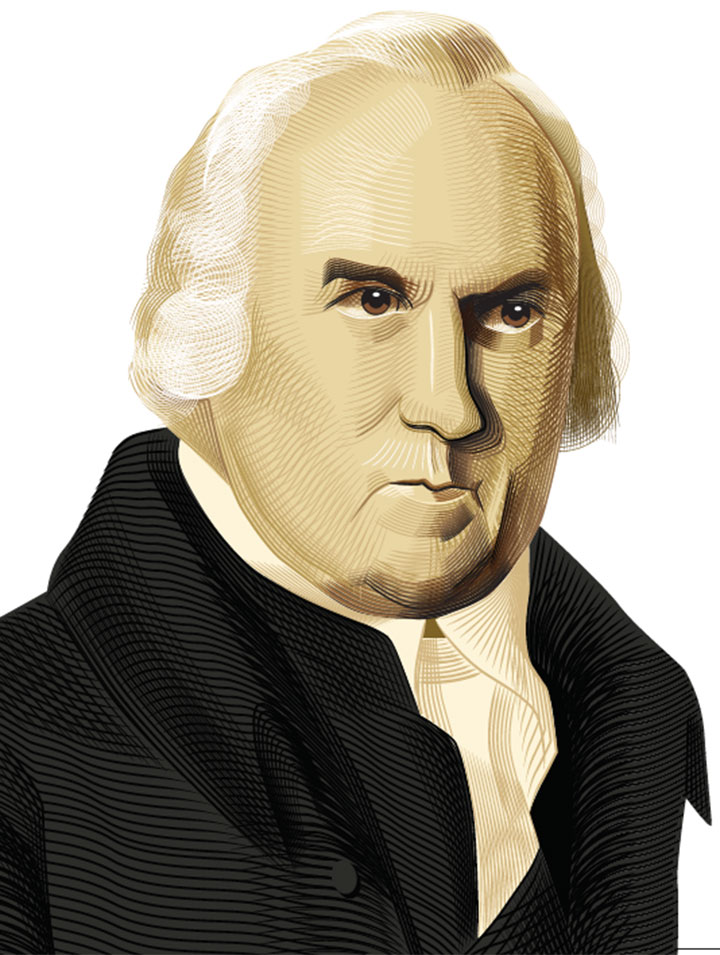In 1777, Robert Blackwell 1768 *1782, a minister with parishes in New Jersey, joined the Continental Army at Valley Forge. The only Anglican cleric in the state to side with the rebels, Blackwell had tried to hold on to normalcy when fighting broke out, carrying on regular services while leaving out prayers for the health of the king, until the movement of troops and political strife in his parishes made the pretense impossible. “All is in confusion,” he wrote to his superiors just before leaving.
In the army, he served as both chaplain and surgeon, drawing on his religious training at The College of New Jersey and a lifelong interest (but no formal training) in medicine. A contemporary historian described Blackwell’s first winter: “For a long and dreadful winter he had made his daily and nightly rounds through the hospitals of Valley Forge, ministering to the souls and bodies alike of the 6,000 sick and wounded soldiers who were there, without blankets or clothes, freezing and dying in the wards.”
Blackwell left the army in 1780 — a year in which he got married, his father died, and he began looking for a new ministry. In 1781, he began work as an assistant minister at Christ Church and St. Peter’s, sister churches in Philadelphia. George Washington was in his congregation; the general usually attended Christ Church, but occasionally St. Peter’s, where his box pew is preserved today.
“For a long and dreadful winter he had made his daily and nightly rounds through the hospitals of Valley Forge.”
In Blackwell’s churches, many of the more affluent and socially prominent congregants had opposed the Revolution; other congregants, nicknamed “the hot Whigs,” had supported the rebels warmly and rained fire on all who did not. Blackwell and his superior, Bishop William White, managed through shrewd diplomacy to preserve the union of their parishes, with White preaching republican virtues and Blackwell playing the pious though worldly High Churchman for the toffs. “Being withal a man of unquestioned piety and great propriety of life,” wrote a contemporary, “he maintained a dignified position, and was extensively deferred to by an opulent and worldly class ... .”
Christ Church and St. Peter’s became nurseries of the Episcopal Church in the United States. Blackwell was, by all accounts, a dry speaker. Friends and parishioners tried to be kind. One called Blackwell “a scholarly and sensible preacher of the English university cast. His sermons ... were, like those of the higher classes of the English clergy in the last century, calculated for educated hearers more than to arouse an indifferent or slumbering congregation.” Another, noting the “abundant scholarship” in his sermons, said, “His voice was agreeable and well-modulated, but neither in it nor in his gestures was there much elocutionary display.” A childhood friend told a historian that Blackwell’s sermons were “to me never uninteresting.”
No matter. Blackwell performed his ministry for the divided souls of a newly united nation for some 50 years, continuing to assist with duties in his parish for decades after his retirement in 1811. He is buried in Philadelphia, next to St. Peter’s Church.












1 Response
Norman Ravitch *62
6 Years Ago'Who will rid me of this troublesome priest?'
Henry II of England supposedly said this about Thomas a Becket, archbishop of Canterbury. I know nothing about Robert Blackwell save what is recounted here, but I am convinced that the intrusion of clergy into public life has been the bane of western civilization from the time Constantine took advice from a Spanish bishop; his successors turned the Roman Empire into a regime of religious persecution, ignorance, and ultimate disaster. The GOP to this day allows ignorant clerics from the evangelical right to lecture our people. Jefferson knew this would be a mistake. They GOP has worked to turn Trump into a messiah and possibly a martyr to their false version of truth.